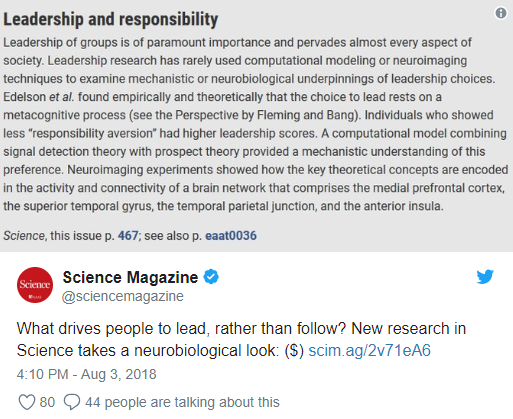what distinguishes the leaders of science

Taking responsibility for making decisions that affect the welfare of others sets leaders apart from followers, new research has shown.
Researchers from the University of Zurich investigated what distinguishes people with high leadership capabilities from others and identified one key characteristic: the ability to make decisions that affect not just themselves but also influence the lives of others.
Parents, company bosses, army generals, teachers and heads of state are among those who are known to demonstrate these qualities, the team said.
As part of the study, the researchers gave the participants the ability to make a decision themselves or delegate it to the group.
Experiments were based on two scenarios – one where the decisions only affected the decision-makers themselves, and one where decisions resulted in consequences for the whole group.
The researchers also analysed the individuals’ intuitions that guided the decision-making process, such as whether they were less afraid of the consequences of taking risks, whether they liked being in control, or whether they were more willing to take on responsibility for others.
The team used a technique known as functional magnetic resonance imaging (fMRI) to analyse what was going on in the participants’ brains while they were making those decisions.
The results show that responsibility aversion, or the unwillingness to make decisions which also affect others, was driven by a greater need for certainty about the best course of action – especially when the decision had an impact on other people.
For example, in a risky investment scenario, a person might see it as a good opportunity for themselves but as a less likely option if it meant losing money for the whole family.

Dr Micah Edelson, a researcher at the University of Zurich’s Department of Economics and lead study author, said: “We find that individuals make the choice to lead in a multi-step fashion – where part of the processes include setting a general threshold for the quality of information towards the degree of certainty they require for making the choice.”
By creating a mathematical framework, the researchers found that leaders are less likely to change the threshold of certainty when they were making the decisions for others instead of themselves.
Dr Edelson added:
“Because this framework highlights the change in the amount of certainty required to make a decision, and not the individual’s general tendency for assuming control, it can account for many different leadership types.
These can include authoritarian leaders who make most decisions themselves, and egalitarian leaders who frequently seek a group consensus.

Congratulations @sobolev! You have completed the following achievement on Steemit and have been rewarded with new badge(s) :
Click on the badge to view your Board of Honor.
If you no longer want to receive notifications, reply to this comment with the word
STOPCongratulations @sobolev! You received a personal award!
Click here to view your Board
Do not miss the last post from @steemitboard:
Congratulations @sobolev! You received a personal award!
You can view your badges on your Steem Board and compare to others on the Steem Ranking
Vote for @Steemitboard as a witness to get one more award and increased upvotes!